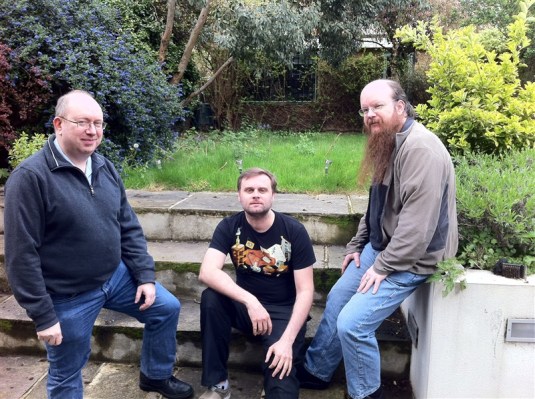Storybricks co-founders’ Stéphane Bura, Rodolfo Rosini, and Brian Green.
After a courageous 5 years, it’s game over for Storybricks, the AI gaming startup best known for its work on EverQuest Next, the upcoming new release in the EverQuest MMORPG franchise.
In a newsletter sent out last week, the London and San Diego-based company announced that it was closing down, and that Storybricks founders, Rodolfo Rosini and Stéphane Bura, are moving onto their next venture, a new startup in the AI space but one that isn’t related to gaming.
“The journey we took exactly 5 years ago to change artificial intelligence in games has come to an end. We tried our best, the world changed a bit, and now it’s our turn to take a bow and move on,” write the pair.
Originally launched with a super-ambitious mission (and a failed Kickstarter campaign) to create a new browser-based MMO that would let users turn stories into games, Storybricks since pivoted to a B2B play, which saw it license its AI engine for online games to third-parties. One of those third-parties was Sony Online Entertainment, who recruited Storybricks to consult on the development of EverQuest Next.
On that note, Rosini and Bura are insistent that EverQuest Next’s new ownership — Sony Online Entertainment was recently acquired by Columbus Nova — had nothing to do with Storybricks’ decision not to renew the EverQuest contract or to ultimately shut down the company.
“It was our own decision and Sony Online Entertainment (now Daybreak Games) bears no fault for it. Sony Online Entertainment had been up for sale for a long time so our exit had no connection with the Columbus Nova acquisition,” they write.
Instead it was a combination of the stress that continually traveling between the UK and U.S. had placed on family life, along with a desire by Rosini and Bura to go “beyond games and find a different vision, one that was more inclusive and could make a difference for a large number of people.” The latter alluding to their new startup Metatron, which plans to “change the way we interact with our devices”.
I also understand that Storybricks was chronically underfunded, almost permanently existing with a runway of between 120 and 30 days, having raised under a million dollars in total. And whilst the Sony Online Entertainment deal and others brought in “significant” revenue, unable to raise more funding, most of that money was ploughed back into R&D or used simply to keep the lights on.
“We were too much of a tech company for the gaming industry, and too much of a gaming company for the tech industry,” Rosini told me during a call.
However, that didn’t stop Storybricks making one last audacious move. Having teamed up with an investment bank, the 10-person startup actually tried to buy Sony Online, in order to see through their work on EverQuest Next and turn the company around.
“Alas, it was not meant to be as the terms offered by Sony Japan were unacceptable to us and to our investors. It is my understanding that other buyers had the same reaction and, in the end, Columbus Nova got a completely different deal that the one we were offered, but by then our investor group had moved on,” write Rosini and Bura.
